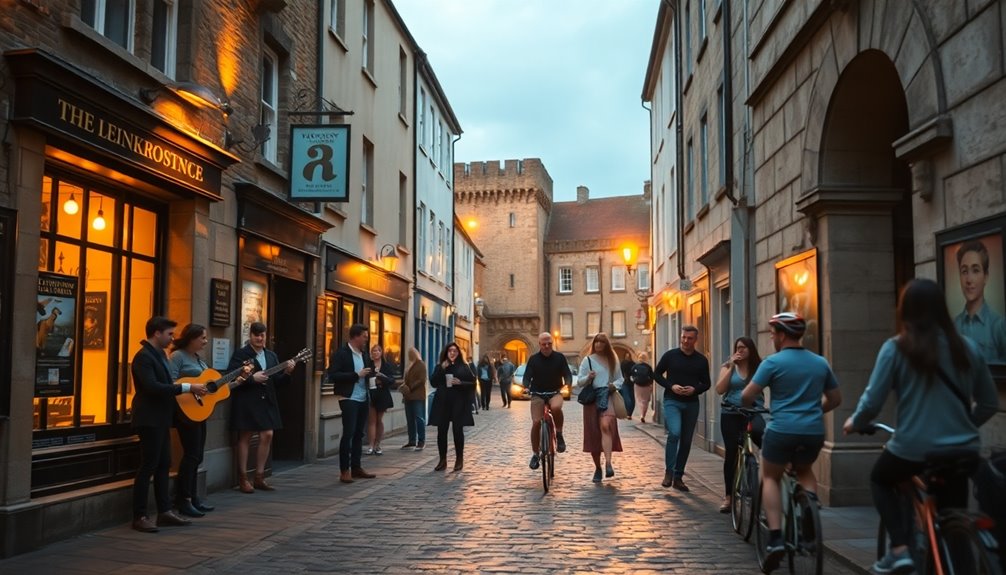
Pick a city that puts you in cafés, classrooms, festivals and homestays every day. In Dublin you’ll find language schools, guided outings and easy transport for city-life practice. Galway’s student scene and festivals make conversation natural. Cork offers dialect exposure and community events. Limerick is affordable with intensive courses and short placements. Waterford gives homestays and heritage-based practice. Kilkenny and Sligo add arts, clubs and outdoor interaction for spoken English — keep going to get specifics.
Dublin — City Life, Language Schools, and Cultural Immersion
Although Dublin hums with city energy, it’s remarkably easy to find pockets of conversation that feel welcoming and natural. You’ll notice neighborhood cafés and parks where locals chat, giving you low-pressure opportunities to practice. Language schools are plentiful and often pair classroom work with guided outings, so you can apply lessons to real situations while staying in safe, structured groups. Look for programs that organize language exchange nights; they’re excellent for meeting locals who want to help and learn in return. Cultural events — from small music sessions to community festivals — create relaxed settings to listen, join conversations, and build confidence. Transport and city services are reliable, letting you explore after classes with predictable safety. Choose schools with vetted homestays or supervised shared housing to guarantee comfortable immersion outside class hours. With sensible planning and participation in organized activities, you’ll improve quickly while feeling secure and supported in Dublin’s urban but friendly environment.
Galway — Student Atmosphere and Conversation Opportunities
Anyone looking for lively, approachable conversation will find Galway hard to beat — its compact size and big student population make chat easy to start. You’ll find conversation spilling from cafés, libraries, and lecture halls, so practicing English feels natural and low-pressure. Join language exchanges or student clubs and you’ll meet peers enthusiastic to correct gently and celebrate progress. Galway festivals create communal spaces where you can practice listening and speaking with friendly locals and visitors alike; events range from street performance to storytelling, offering varied registers and accents.
You’ll feel safe trying new phrases — neighborhoods are walkable and welcoming, and many venues advertise inclusive policies. Use mealtimes to talk about food: local cuisine is a great icebreaker, whether you’re ordering seafood or asking about a recipe. If you prefer quieter practice, book a tutor or small group session; if you like spontaneity, strike up a conversation at markets or during performances. Either way, Galway supports steady improvement in a comfortable setting.
Cork — Local Dialect, Community Programs, and Practical Use
When you arrive in Cork, you’ll notice a distinct local lilt and vocabulary that make everyday conversations a useful study in regional English—listen for softer consonants, clipped vowels, and playful idioms that differ from Dublin speech. You’ll quickly pick up on Cork dialects through market chats, cafés, and buses; locals are friendly and generally patient with learners. Join community events like book clubs, volunteer drives, and music nights to practice listening and speaking in safe, supportive settings. Short-term language exchanges and guided walking tours help you match vocabulary to context, so you’ll use phrases naturally. Look for programs run by libraries and cultural centres that emphasise conversation skills and local customs; they often post schedules online and welcome newcomers. For practical use, practise transactional language in shops and at post offices during quieter hours, and carry a simple phrase list. If you stay aware of your surroundings and follow local guidance, Cork offers steady, low-risk opportunities to immerse yourself in authentic spoken English.
Limerick — Affordability, Intensive Courses, and Work Placement
While Limerick is smaller and less touristy than Dublin or Cork, it’s known for being one of the most affordable Irish cities for learners, with cheaper rent, cafes, and course fees that stretch your budget further. You’ll find affordable housing options near campuses and language schools, letting you live within walking distance of classes and feel safe moving around at different times of day. Schools here offer intensive workshops focused on pronunciation, workplace English, and exam prep; they’re structured, small-group sessions that push your skills quickly without overwhelming you.
If you want practical experience, many programs arrange short work placements or volunteer projects with clear supervision, so you can practice language in real settings while staying protected by host organization guidelines. Expect helpful orientation, local support contacts, and straightforward application steps for placements. Limerick’s compact layout, supportive institutions, and lower costs make it a practical choice if you want focused, secure immersion that respects both budget and wellbeing.
Waterford — Small-City Practice, Homestays, and Heritage Context
Because Waterford blends a compact city feel with rich Viking and medieval heritage, you’ll get focused speaking practice without the noise of larger tourist hubs. You’ll find homestays where hosts prioritize your comfort and local safety, giving you regular, low-pressure opportunities to practice conversational English at meals and around the house. Walking the streets brings waterford history alive — from the Viking Triangle to narrow lanes — so you can discuss landmarks, ask questions, and watch language evolution in real time as older phrases meet contemporary usage.
Small class sizes at local schools mean more individual feedback, and community events let you test vocabulary in controlled settings. Transport is simple and predictable, reducing travel stress while you explore museums and riverside cafés. If you want steady progress in a secure environment, Waterford offers immersive days that balance cultural depth with practical speaking practice and reassuringly stable routines.
Kilkenny — Short-Term Immersion, Arts Scene, and Speaking Clubs

Although compact, Kilkenny packs a vibrant arts scene and plenty of short-term immersion options that’ll sharpen your speaking quickly; galleries, theatre nights, and pop-up events give you instant topics to discuss, and local language schools and conversation clubs accept learners for week-long courses or drop-in sessions. You’ll find Kilkenny culture woven into safe, walkable streets where guided cultural tours and museum visits create structured speaking opportunities. Join evening conversation circles in cafés or community centres — they’re low-pressure, moderated, and great for practicing everyday language. Time your visit for Kilkenny festivals to benefit from themed workshops and volunteer roles that let you interact with locals and other learners. Short stays work well: morning classes, afternoon cultural activities, and evening social practice keep you engaged without feeling overwhelmed. Accommodation choices, from guesthouses to small hotels, are close to activity hubs, so you can move between learning and leisure easily while keeping safety and comfort priorities front and centre.
Sligo — Outdoor Activities, Informal Interaction, and Pronunciation Practice
If you love outdoor learning, Sligo’s rugged coastline, hills and lakes make it easy to pick up conversational English through shared activities; hiking Ben Bulben, surfing at Strandhill, or joining guided coastal walks give you natural prompts for asking questions, swapping stories, and practising local pronunciation. You’ll find Sligo surf lessons that mix safety briefings with relaxed chat, so you can learn vocabulary about waves, boards, and weather while an instructor watches your technique. On easy day-hikes or lake-side picnics you’ll practise colloquial phrases with locals who value friendliness and clear speech. Sligo festivals are another low-pressure way to listen and join in — music, literature, and food events offer short exchanges and pronunciation clues in real contexts. To stay safe, check forecasts, follow guides’ instructions, and choose group options if you’re new to outdoor sports. These settings build confidence: you’ll leave with improved listening skills, clearer articulation, and memories that make language learning feel practical and enjoyable.
Some Questions Answered
Are There Medical Facilities and Emergency Services Near Language Schools?
Yes — you’ll find medical facilities and emergency services near most language schools, so healthcare accessibility is generally good. You can expect nearby GP clinics, pharmacies, and hospitals with reliable emergency response times, especially in larger towns and cities. Ask your school for exact locations, insurance guidance, and emergency numbers. Carry your health card, know the local ambulance number, and note the nearest clinic to feel secure and prepared.
What Visa or Entry Requirements Apply for Short-Term Study Stays?
For short-term study in Ireland, you’ll usually need to check visa types and entry restrictions based on your nationality and course length. EU/EEA/UK citizens don’t need visas; others may use a short-stay (C) visa for courses under 90 days or a long-stay (D) visa for longer programs. You’ll have to show proof of enrollment, funds, return travel, and travel insurance. Follow immigration rules closely to stay safe and compliant.
Are There Reliable Options for Vegetarian, Vegan, or Specialty Diets?
Yes — despite traditional menus, you’ll find dependable vegan options and specialty-diet choices. You’ll spot modern cafes and long-standing pubs side by side, offering clear labels, allergy-aware staff, and plant-based mains. Local markets brim with fresh produce and vegan cheeses, so you can cook safely in student housing. Ask about cross-contamination, carry essentials, and use apps or college resources to confirm menus before dining out for peace of mind and safety.
How Accessible Are Cities for Travelers With Mobility Impairments?
You’ll find many Irish cities reasonably accessible, though it varies. Dublin and Galway offer accessible transportation options like low-floor buses, accessible trains, and taxis with ramps. Look for wheelchair friendly accommodations with roll-in showers and elevators, especially in newer hotels. Cobblestone streets and historic sites can be challenging, so plan routes, contact hosts in advance, and carry a mobility card. Prioritize central locations for safer, shorter transfers and better support.
Can I Find Certified Exam Preparation (Ielts, TOEFL) in These Cities?
Right off the bat: you’ll hit the ground running — yes, you can find certified exam preparation like IELTS and TOEFL in those cities. You’ll locate official exam centers and reputable preparation courses in Dublin, Cork, Galway and Limerick. Classes and mock tests are offered by language schools and private tutors, many with accessibility options. You’ll get clear guidance on registration, deadlines and safety measures so you can prepare confidently and securely.
Summing Everything Up
You’ll find Ireland’s cities are like different instruments in one lively orchestra — Dublin’s bright brass, Galway’s warm strings, Cork’s steady percussion, each tuning your English in its own way. Pick the place that matches your tempo and immerse yourself: attend classes, join conversations, stay with locals, and use every chance to speak. Immersion will polish your fluency until your words ring clear, so let the city’s rhythm shape how you talk.
